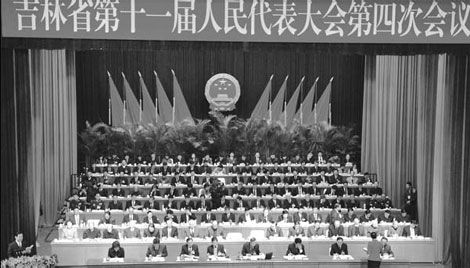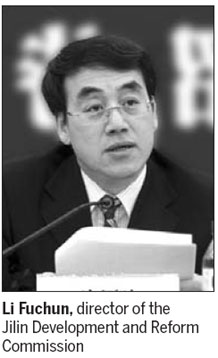Economy
Jilin province has big plans for key industrial projects
By Liu Mingtai and Zhang Zhao (China Daily)
Updated: 2011-02-23 11:08
 |
Large Medium Small |
|
 |
|
Conference representatives at the fourth plenary session of the 11th Jilin Provincial People's Congress, on Feb 12. [Photo / China Daily] |
The Jilin provincial government is drawing up a 12th Five-Year Plan (2011-2015), and is considering spending around 1 trillion yuan ($152 billion) on major projects during that time.
These include a high-speed-railway network, a nuclear power plant, and a water channel.
"Jilin will develop a series of major industries and industrial bases with an international reputation to give it a competitive edge," Li Fuchun, director of the provincial development and reform commission, told a press conference on Feb 13.
|
 |
Around 400 billion yuan will be used to improve transportation infrastructure. The government wants to use highways and railways to link every county.
"We'll also build new airports and some old ones will get expanded to provide a more modern, comprehensive, multilevel traffic system," Li added.
An additional 400 billion yuan or more will be spent on developing new energy, such as nuclear power, wind power and biofuels.
The government also plans to improve the electric grid in the countryside by developing one based on digital technology to save energy, cut costs and increase reliability.
Upgrading the information infrastructure will cost an additional 30 billion yuan or more, for broadband and fiber optic access, and for a digital public information service system.
Work on the plan's guidelines began more than a year ago as a joint effort involving everyone from the provincial government to brainstorming local leaders.
Jilin was one of China's earliest industrial centers, but it needs a people-oriented development model for the coming years, one that can balance urbanization, industrialization, and modern agriculture. There will also have to be an effort to improve the standard of living both in urban areas and the countryside.
According to the plan, provincial GDP annually should exceed 1.5 trillion yuan by the end of 2015, an increase of 640 billion yuan over last year's figure. Service industries are expected to contribute 40 percent of the GDP.
Per capita GDP is expected to reach 53,820 yuan by that time, or 72 percent more than the year of 2010.
The province also has some ambitious ideas about becoming one of the world's major passenger train manufacturers, and to be able to cover more than half of the domestic market.
| 分享按钮 |